
Dune: Awakening was first announced back in 2022, and it's been a long, long wait to find out what this game – billed as an open-world survival MMO – actually looks like. "It's kind of funny, because we originally thought we'd be out before the first movie," creative director Joel Bylos jokes at a press event. But now, Funcom is finally ready to offer a few drops of vital refreshment to thirsting fans, and the scope of Awakening is nothing if not ambitious.
"At Funcom, I feel like we take risks as a company," Bylos says. "We do things that other people aren't willing to do. We're not corporate enough or large enough to be trying to make very streamlined games that come out every single year." Bylos highlights the studio's development of instancing for Anarchy Online, real-time combat for Age of Conan, and the ARG that helped tell the story of The Secret World. And, of course, "Conan Exiles had that slider that everyone knows about."
Regardless of the opportunity to select the size of your character's naughty bits, Conan Exiles was Funcom's first survival game, a notable departure for a studio that had primarily been known for MMOs up to that point. With Dune: Awakening, the company aims to combine those legacies, finally building the full survival MMO that it's felt like the industry has been on the cusp of for years. The formula to make that genre combo work sounds pretty simple: survival is your origin story, but the endgame is politics.
Surviving Arrakis
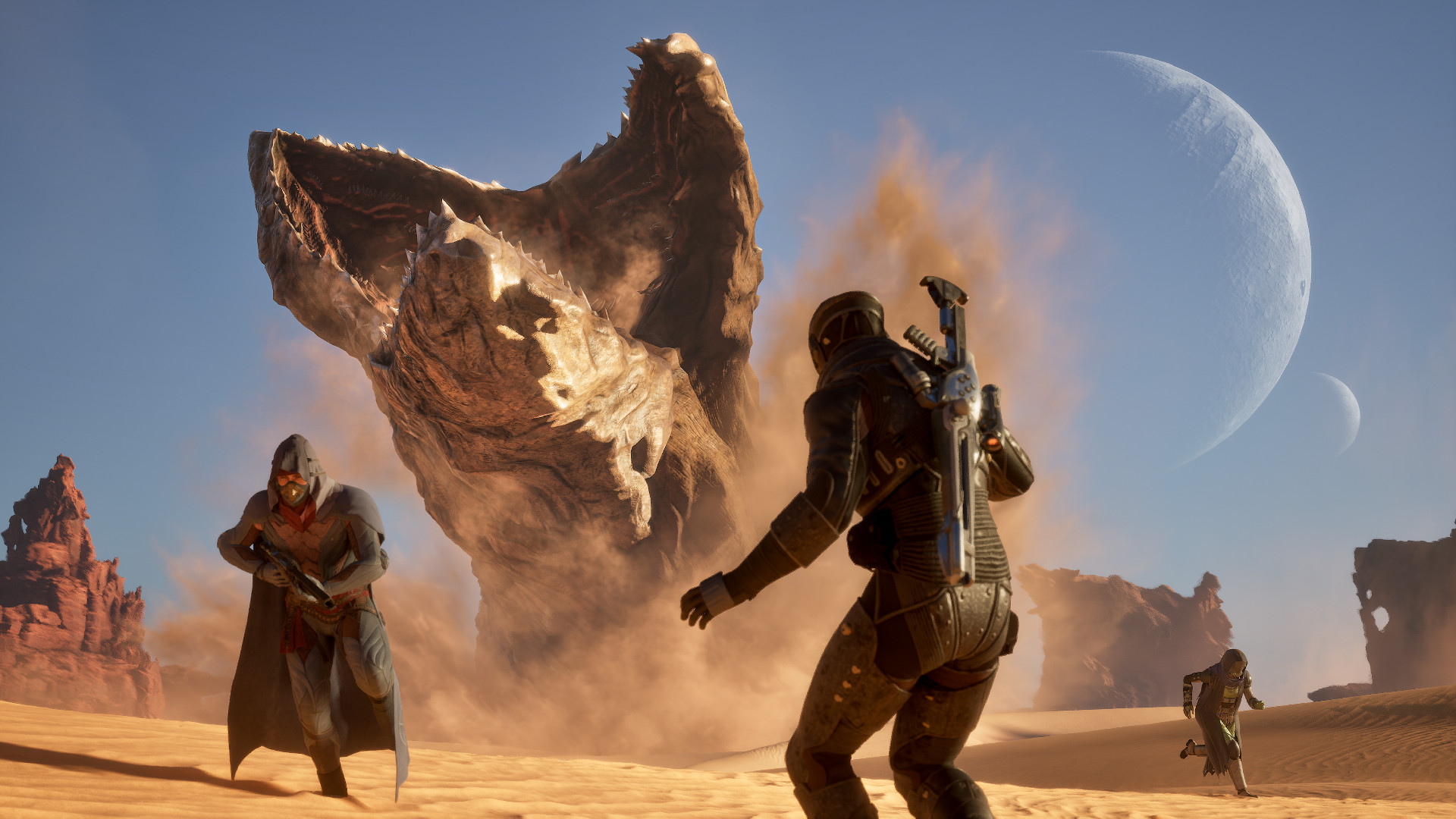
Dune: Awakening builds directly on the survival and crafting mechanics of Conan Exiles, but introduces improvements like co-op building, where you can place down a hologram of a construction and have other players help you build it. You can also save your builds as blueprints, which you'll then be able to either deploy elsewhere or share with other players. There's even a proper land claim system, which offers conveniences like allowing your crafting devices to pull resources from any container on your base.
These are pretty iterative updates on the survival formula, but the basic mechanics of Dune: Awakening sound very familiar. You'll gather resources like stone and iron, and use them to craft equipment and bases. The twist on survival is that this is, of course, a Dune game set on Arrakis, which means you've got to pay extra attention to things like water and sunlight. You'll want to stick to the shadows to avoid the heat, and your hydration situation might get bad enough that you'll need to drink the blood of your enemies.

Read our Dune: Part Two review – "A sequel that ranks alongside The Dark Knight and The Empire Strikes Back"
Then there are the sandworms. True to the lore, these are omnipresent threats that you can only hope to escape, never kill. As soon as you step on the sand, the appearance of a worm is inevitable – either a young one that can simply kill you, or one of the giant ring-mouthed beasts that can destroy whatever you've constructed in the area. You'll have access to thumpers that can distract the worms or, if you're particularly devious, you can use the devices to send sandworms after your enemies.
It might get old exploring endless deserts all the time, but there are special areas that offer some visual and gameplay variety. There are shipwrecks, which Bylos describes as like "old classic MMO open ended public dungeons" that serve as PVP areas, as well as desert botanical testing stations which you can take on in a variety of ways.
In those testing stations, "they're usually doing experiments. Sometimes it's like, they're trying to figure out how to grow plants.These were all sealed off 10,000 years ago, and so as you explore them, you don't know what you're going to find. Some of them have been opened by bandits, some of them have been opened by the Fremen, some of them the experiments down there have mutated. It's a little bit like vaults in Fallout, I would say."
Faction warfare
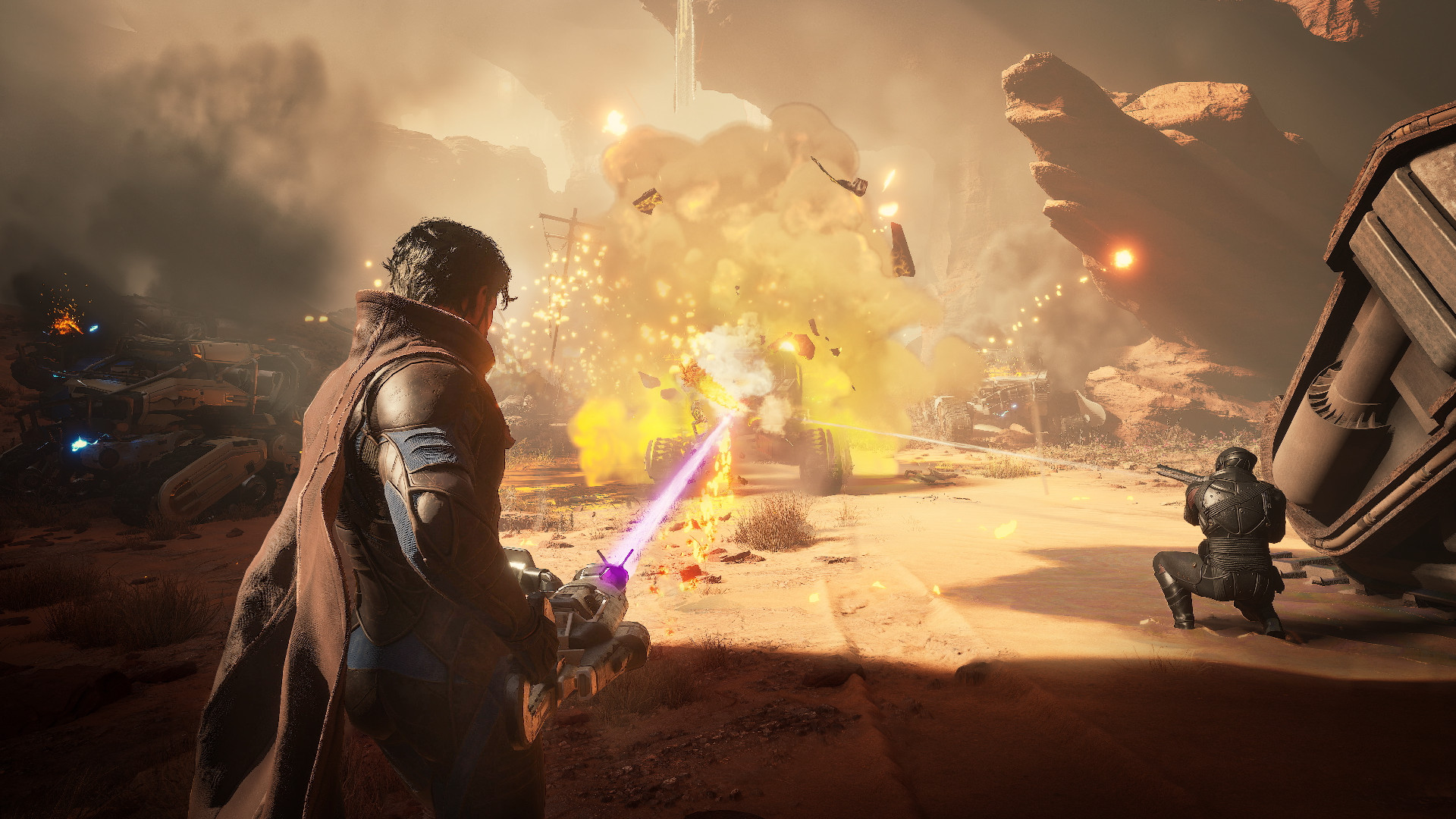
The issue with survival games is that, eventually, you win. Or rather, you get to a point where you've gathered enough resources and crafted enough equipment that the basic threats aren't really threatening anymore. In Dune: Awakening, the endgame becomes what Funcom describes as "political survival," and this is where the social elements you'd expect from a game billed as an MMO start to come in.
You'll eventually choose a faction to join, with groups like House Atreides and House Harkonnen standing in for, say, the Alliance and Horde of a World of Warcraft. "You win votes on the Landsraad by doing objectives for different delegates," Bylos explains. "The thing is, both factions want those votes. The idea is that one of the delegates might be asking you to deliver 10,000 kilograms of spice, and both factions need to go out and harvest that."
Bylos explains that the political system is "not as freeform as Eve Online in any way, shape or form," so you won't be building your own Great Houses for a true political sandbox. Instead, the factions are a way to force players into conflict over the resources that everyone wants. There's some sort of scoring system that might force player-run guilds within each faction into conflict with each other, but the real intent of this system is to give Atreides and Harkonnen players reasons to fight.
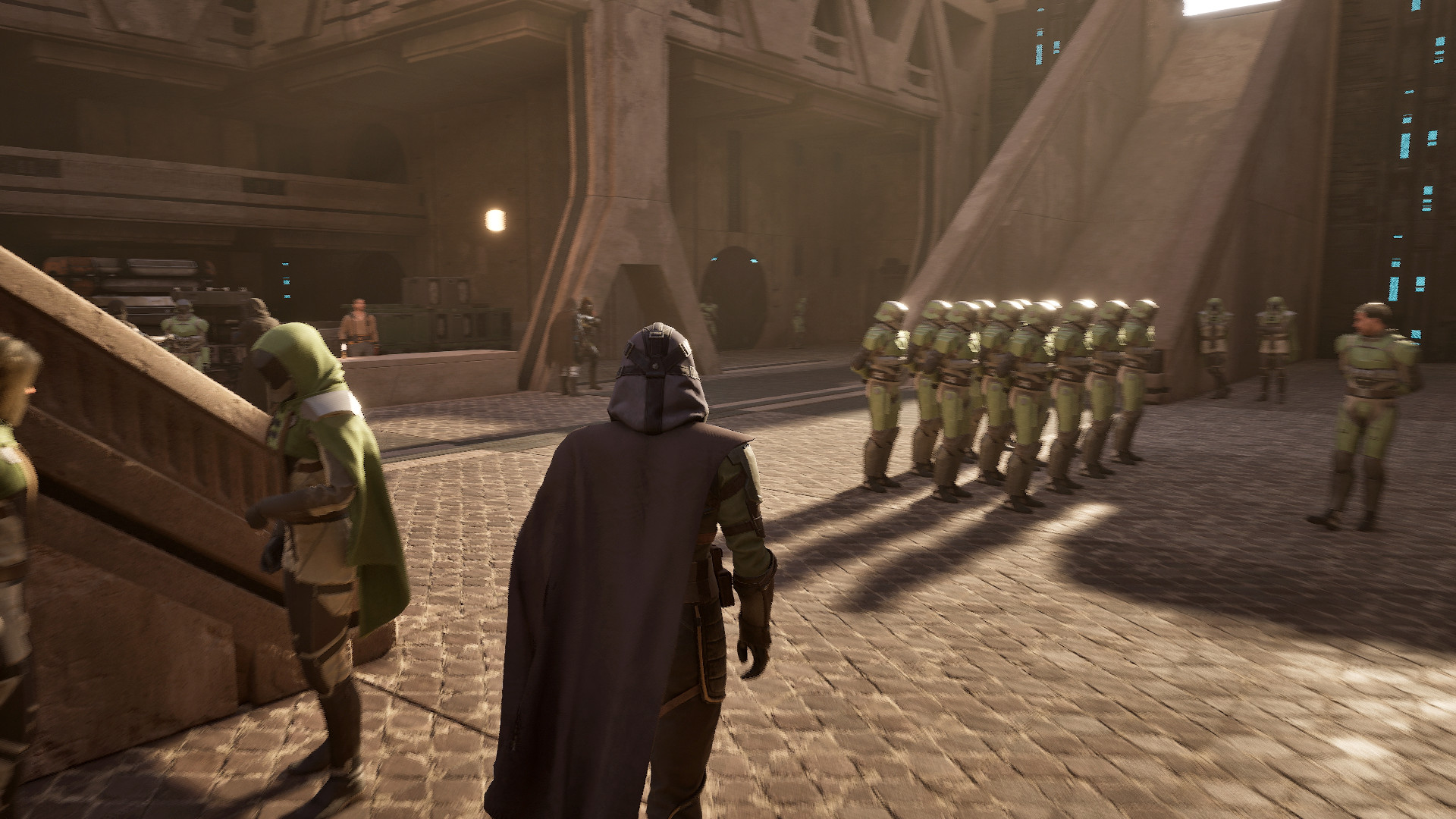
There are still questions about how many players the game supports, and that's a question that the developers are still figuring out the answer to, but they're building it to be big. "We have this technology, which we call IGW – Infinite Game World," Bylos says. "I think Star Citizen is talking about server meshing, and it's kind of a similar idea. We have many servers that mesh together, so we create a seamless map, and there's no transition. If you played Atlas back in the day, Atlas had a transition time between the maps, but we don't. It's seamless, and you shouldn't even notice that you're crossing servers."
That still leaves the question of just how many players each of those meshed servers supports, which is something Funcom is still optimizing based on beta tests. "We're saying, you know, thousands of players online and we're trying not to bullshit people. So our goal is to have at least several thousand."
Destroy and build
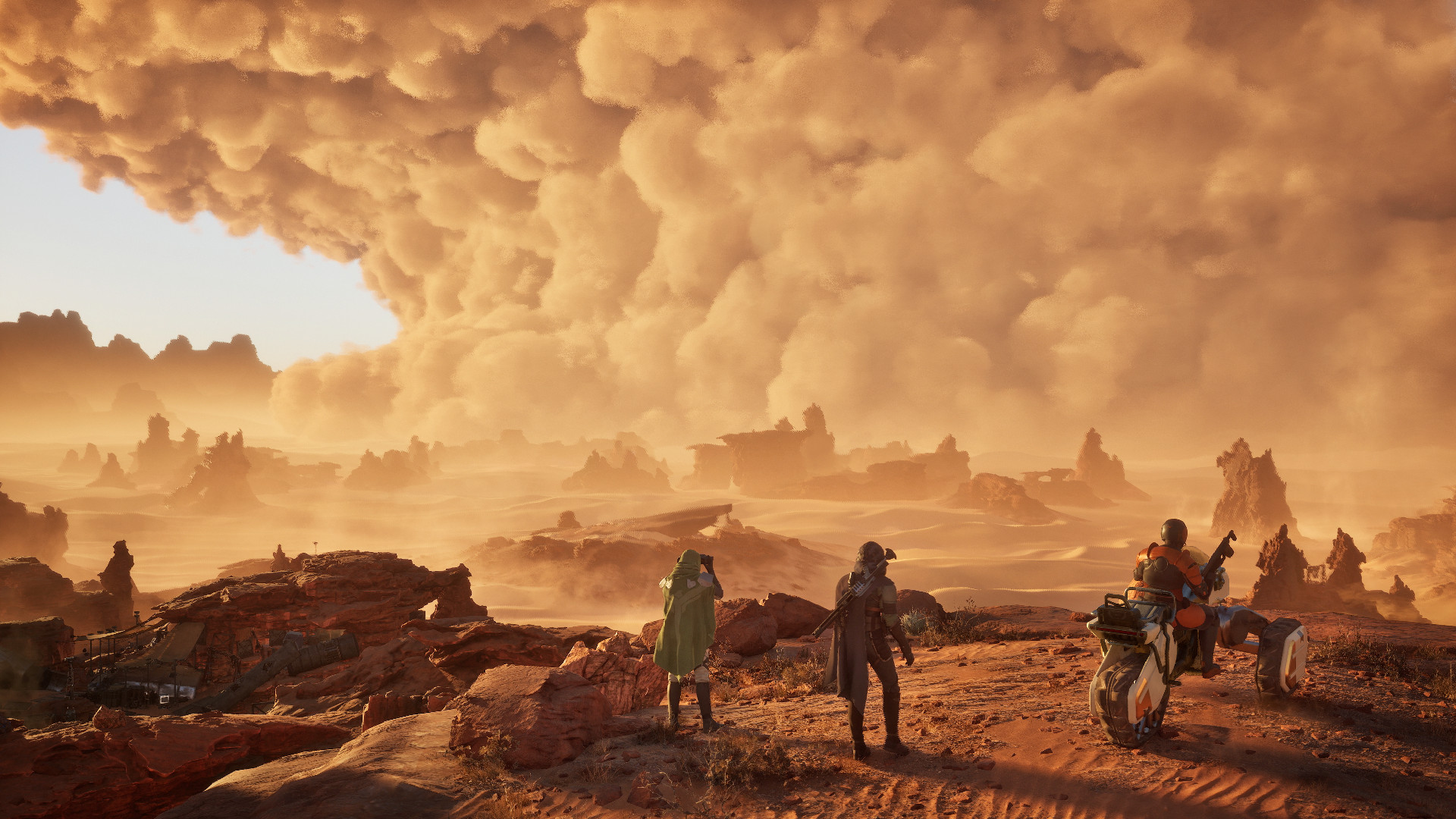
The heart of the conflict between players is the deep desert, or shifting sands, an area rich in resources but one which is regularly wiped away by the ravages of coriolis storms. "It's emulating kind of the way Rust servers work, if you think about how they have the monthly wipe cycle or whatever," Bylos says. But here, those wipes come weekly, and this map sounds like it's going to be the heart of the competition over those meta political objectives.
Out in the deep desert, nothing you build is safe, but the rewards are much greater – and since the whole area is PVP, things are likely to get desperate out there. Bylos expects players to use the blueprint system to quickly build logistics bases in these dangerous areas as they rush to be the first to claim whatever objective the Landsraad is looking for at that time.
If you're not up for PVP, there are still options for you to contribute to the faction war and, importantly, spaces for you to build a permanent base that won't be threatened by the shifting sands or other players. (In the static map, only certain areas are marked for PVP.)
"Maybe you want to craft things at the base, or help refine spice, or do those things that are actually helping your faction to compete in the war that's going on in the deep desert," Bylos says. "Maybe you're building vehicles for them, maybe you're building weapons for people."
There's also the Exchange, which is essentially an auction house in the proper MMO tradition where you'll be able to sell things even including your custom-made base blueprints.
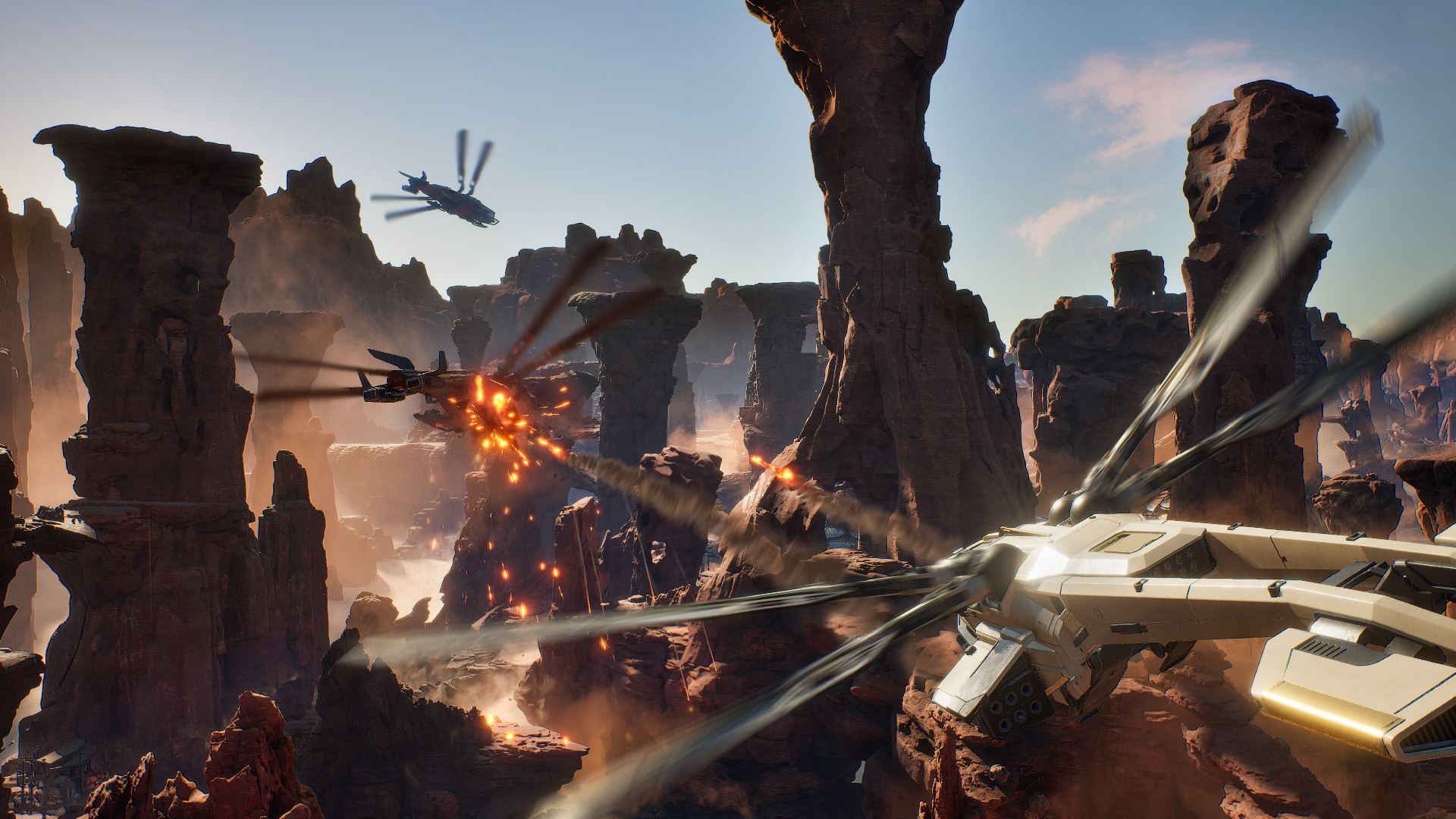
While Funcom has now revealed a lot about Dune: Awakening, there's one key detail that's still missing – a release date. There's no word on when the game will finally launch, though since it's currently in closed beta that at least means it's in a playable state, and hopefully wider betas will soon follow. After coming to understand the sheer scope of what Dune: Awakening is trying to be – a proper survival game and a proper MMO all in one – I think I'm starting to understand why it's taking so long.
But if Awakening is ultimately able to deliver on that scope, it could be something special, taking survival games to a scale we've rarely seen before. I think this anecdote from Bylos illustrates the potential: "We even made the joke that what's going to happen is there's gonna be a taxi service where people fly down in an ornithopter and pick up new players, because they need someone in their guild. They're going to come to the starting area, pick up noobs who are naked, give them armor, give them a vehicle and say, 'come join our guild!' And then fly them off, and take them out to the deep desert to use them as cannon fodder."
Sure, that specific example might border on griefing, but it also illustrates a pretty wide possibility space for how players can interact with each other and the game, which is rare to see in something with servers supporting thousands of people. Here's hoping Dune: Awakening manages to launch and deliver on those ideas before we start considering the possibilities of Dune 3.
Dune: Awakening is going to have a lot of competition among both the best survival games and the best MMORPGs out there.







